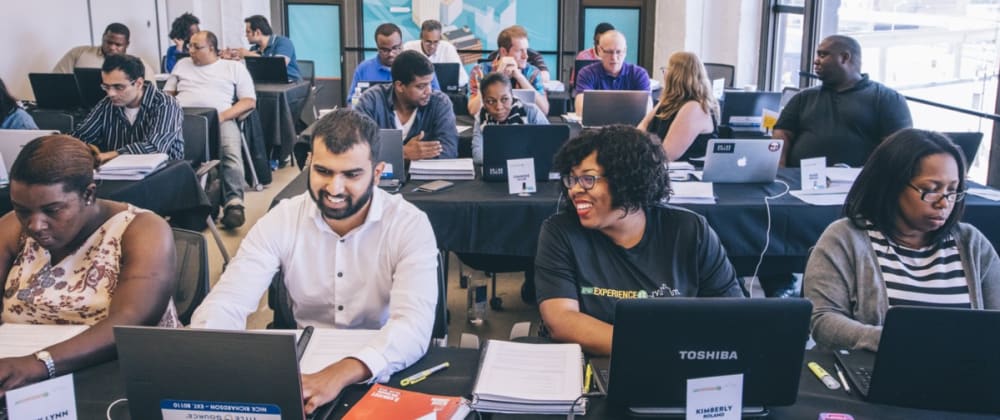Calling all bootcamp grads or those currently in bootcamp! I need your help!
A couple of my friends are looking to make a career switch to coding and were asking me about Bootcamps. I have heard of Flatiron school, which seems pretty awesome but not much beyond that. One friend asked about this Northwestern University one, which looks great based on the brochure, but I would rather get REAL feedback from those who have done them.
Give me all the juice so I can actually make a good recommendation for the next generation of coders! Please and THANK YOU! 😃
PS If you could include what language or part of the stack the bootcamp was focused on that would be super helpful as well!







Top comments (31)
I did a bootcamp in 2016. I went to DecodeMTL in Montreal. (decodemtl.com/)
Prior to doing the bootcamp, I had some knowledge with HTML/CSS from a complimentary course I took in college, and I built a static website once upon a time. That introduced me to the world of coding, and I had a fond appreciation for it and a desire to learn more. However, due to busy schedules, and life, I didn't make it a priority and so didn't go any further with it.
Fast forward to early 2016 I got injured and was unable to leave my house. A few days into my injury I was going a little stir crazy and decided that I should be teaching my self something so that I can feel somewhat accomplished with all this free time I now have. That's when I found codeacademy and started to teach myself javascript.
6 months later I was fully healed, and getting pretty nifty with basic javascript and I was loving it. That's when I decided to make a drastic change with the way my life was headed, and change my career path to become a full stack developer. I decided that I could only learn so much on my own, and that it was time to reach out for help. In other words, I was ready to fully commit and take some kind of course/school.
At the time I was living in Montreal, and I found a few programs that were interesting. One of them was a traditional college program (called CEGEP in Quebec) that took 2 years, and the other option was a coding bootcamp that was only 10 weeks. Both programs seemed to be the same thing, but there was an obvious difference...the time! 2 years vs. 10 weeks! That was kind of alarming to me. Not only that, but the 2-year program was $22,000 CAD and the 10-week bootcamp was $6,000 CAD. At this point, the bootcamp is clearly more appealing than the 2-year course. So, I decided to meet up with the person that runs the course at the college, and the person that runs the bootcamp.
I met up with the person that runs the 2-year course first, and he gave me the whole rundown. He explained to me the curriculum as well as all the other courses that I had to take (like history, gym class, etc.) which I was not fond of. I already did CEGEP and they were not crediting any of my previous courses which meant I had to retake lots of classes. I also didn't like the idea that my time would be diluted with courses that I have already taken. I really just wanted to focus on computers and programming. They also did not offer any kind of post-graduation support or career advice.
At this point, I was quite turned off by taking the 2-year course but I was on my way to meet with the person that ran the bootcamp at DecodeMTL so I was still hopeful.
When I got to the bootcamp, I found out that it was at a WeWork in Montreal. It is a beautiful co-working space, with like-minded people, and a great place to network. I was already very impressed. When I met with the owner of the program, he as well explained to me the curriculum, which was a very similar stack to the 2-year course, but compressed into 10 weeks. The main thing that he said that really made me decide was when he mentioned how quickly technology changes. He said it's very possible that whatever I learned at the beginning of the 2 years, would not apply at the end of the 2 years. Boy was he right! He also told me that at the end of the program we would be building an application and presenting it to what he called "Demo Day" where a bunch of employers would come to see your presentation and speak with you, and hopefully get some interviews for jobs! And the following week, after the bootcamp was over, he urged us to come back in to practice interview questions, help build our resumes as well as make our LinkedIn page appealing to future employers.
Long story short, I liked that the bootcamp was designed to shape you into a developer quickly, efficiently, and offer support post-graduation. I also counted how many hours of coding I would be doing in the 2 year course, and how many hours I would be doing in the bootcamp, and the bootcamp was actually more hours of actual coding as opposed to the 2 year course.
Decision made, I was set on doing the bootcamp!
To get approved to do the bootcamp, I basically had to prove that I understood the basics of Javascript (just understand how to console.log, how to write a function, basic conditionals and loops), and that was it.
I started the bootcamp on July 4th 2016. I was in a class of roughly ~20 other students, all with very different backgrounds and all different ages. Over the course of the next 10 weeks we learned the following:
The course definitely moved quick, so I highly recommend that during the 10 weeks (or however long your bootcamp may be) to not have any other things you need to do. I quit my job for those 10 weeks. So prepare yourself financially, because given the short time frame, you do not want any other distractions. It is important that you do not miss 1 day of the bootcamp, as that is the equivalent of missing like a week in traditional schooling.
We would have a teacher (who was absolutely amazing and very knowleageable) that would teach us in the morning (we started around 10 every day) until lunch time. Then we would have a lunch break, and in the afternoon we would be working on a workshop in teams. Around 5 o'clock people would start leaving to go home, but the people that stayed until 9-10 oclock working and reviewing what we learned in the day, are the people that truly got the most out of the bootcamp and were immediately hired post-graduation. I can't stress enough how important it is that when you do a bootcamp, you need to fully commit, dive in head first, and study and review all the time. If you truly love it, it's really not that hard to do. So if you find yourself struggling to find the motivation to keep going, that might be an indication that this maybe isn't for you right now.
Anyways, after the 10 weeks, Septmber 2nd 2016, me and teammates built and app and got to present it at Demo Day. There were lots of potential employers, slightly intimidating, but also extremely exciting that these people were here to hire us (!!) who a mere 10 weeks ago could not make an app.
After the presentations were over, I immediately had someone come up to me asking me when I wanted to start. I thought he was joking, he was not. I immediately was offered a job, and I said yes. It might not have been my ideal first job, however, seeing as this course was so short, it would only be fresh in my mind for so long, and i did not want to lose every thing I jsut learned while I look for a job for a few weeks. Personally, I preferred to start a job right away in order to keep learning. It was only a 3 month internship anyway so worst case, in 3 months, I would be even smarter and more knowldgeable for my next job.
I am now into my 2nd job as a developer, I finally shed my "junior" title and loving it!
I still have accesss to the Slack channel from my bootcamp, and at any time if I am stuck with something, all the alumni is there to help as well as the teachers and the teacher assistants. That to me is super important, to always have someone I can go to that knows where I've come from, it's like a big group mentor.
I also loved how the bootcamp opened my eyes to how easy it is to learn something new and so quickly. It really taught me a lot about myself and my capabilities and I got to learn how to teach myself and find the resources I need.
This is such an awesome write up! Thank you!
I LOVE that you touched on the college program vs the bootcamp program. One of my friends was asking me if he should go back and do a longer degree program at a university. I told him given that I have seen lots of successful people come out of bootcamps that it was probably better to skip the long and expensive degree program. Your write up just validated my assumption 😊
You're welcome! 😄
Best of luck to your friends!
Hey Katrina! I enjoyed reading your feedback. I have one question. Do you feel that if you hadn't quit your job that you wouldn't have made it through. I know for me either way I choose would be a struggle. Thx!
Hey Ben! I definitely think that if I had been working while doing the course, I would not have had the success I did. I really didn't have time to do anything but my course. I didn't even hang out with friends for the entirety of the course. I told my friends beforehand that they would not hear from me for 10 weeks 😂I completely committed all my time to the course and only the course. I wouldn't recommend any other way since it is such a short amount of time. And since I wasn't going out or doing anything, I wasn't spending any money.
Based on what I've heard from others, I feel like any program would be fine if you're just starting out. I imagine it'll always be a 'how much you put in is what you get out' type of situation when it comes to coding.
With that said, I was a General Assembly student in their fullstack program. We learned the 'relevant/popular' technologies at the time and I was lucky enough to have @phlco and @annarankin as instructors. They were experienced educators and made all the difference. I wasn't impressed with GA"s effort to connect students with job opportunities and I'd say the majority of my classmates did not find work through that avenue.
I think the most important thing GA did for me, was teach me how to teach myself.
This is exactly what I am looking for! I figure most of what they all teach is relatively similar, but things like the instructors and support after bootcamp can make all the difference. Thanks for taking the time to write that up!
I bet @juanita has some thoughts around this. She is a bootcamp grad and now manages bootcamps.
I attended Holberton School.
Here's the meat and potatoes
2 year program (most get jobs after the first 10 months)
No tuition upfront 17% ISA (income share agreement) for 3 years instead
4 campuses (SF, New Haven, Bogotá, Medellín)
Languages: C, Python, Javascript, HTML/CSS. We also do Devops
Peer & Project based learning model
I had a great experience at Holberton School. I attended at the SF campus. It was a tough program, but I was able to secure a job before I finished the 1st portion of the program. I've been working for about 6 months now.
Holberton is modeled after the actual working environment in tech. We do standup everyday. Our projects have deadlines that they need to be completed by. Communication is a large part of the program. Since there are no formal instructors we learn to collaborate to solve problems. There are mandatory review days every week where we recap that weeks projects to solidify what we have learned and to help those that are struggling with concepts.
We start with C to learn programming fundamentals. If you've ever worked in C you know how lightweight it is. We had to do everything from scratch. We weren't even allowed to use
putchar()at first. If we wanted that function we had to build it. We had to buildprintf()from the ground up after the first month. I'm not sure you appreciate how complex a simple print function is until you have to recreate that functionality including the manual memory allocation. Our final project in C was creating a simplified Thompson shell. I swear to you this project changed how I think about the current state of tech. I left that project with the utmost respect and appreciation for the people who laid the groundwork for what we do today.After 3 months we moved to Python, which after C feels like becoming a magician. It's one thing to write Python code. It's a completely other thing to look at the built in functions that Python provides and completely understand how it works under the hood. Game changer.
The last 3 months is spent learning a bunch of different tools and focuses heavily on Devops. Managing servers, automating configuration, setting up monitoring, etc. All in all it's a very thorough program that gives you a strong foundation.
Lastly, social media and writing technical blogs is a required part of the program. I didn't appreciate it at first, but I got my job through the network I built on Twitter and blogs that I've written on Medium.
I would say the hardest part of the program was surviving San Francisco, since it's so expensive. I really wish I could have gone to the New Haven campus as it's much cheaper to live there. Besides that I was very happy with my experience. I changed my life in less than a year, and the community that the school has built is amazing.
I attended Tech Elevator. They have locations in Cleveland, Cincinnati, Columbus, Pittsburgh and Detroit. I only have good things to say about the training that I received. I had multiple job offers lined up before I had even graduated from awesome companies.
There are two language tracks that follow the same general curriculum: C#/.NET and Java. I was a part of the C# group.
The curriculum, generally speaking, was as follows:
Throughout the program, we followed agile practices to get accustomed to them, and we used git the entire time. Additionally, we had multiple capstones. If you want to check them out, I have them on my GitHub profile!
Along with the programming aspects, there was extensive career development. We went over how to interact with recruiters, made our resumes, and had mock behavioral and technical interviews. We also had an event called matchmaking, which was a day of 30 minute interviews with about 12 companies.
I was really hesitant to attend a bootcamp, but I couldn't be happier with the decision that I made. I would go to TE again, and I cannot recommend it enough. If you have any questions about TE or are thinking about attending, please reach out!
Yay Tech Elevator!
I could imagine this thread becoming a very valuable resource for anyone Googling "Best coding bootcamps" etc. in the future.
I just pinged a couple folks I know who went to bootcamps to come comment.
THANK YOU!!!!
I did Flatiron School’s Immersive Web Dev bootcamp in NYC about 2 years ago.
I’d definitely say one of their stronger points is their ability to connect students with jobs, and it’s how I found my software engineering job. I think the same would apply to the majority of my cohort. They were extremely supportive during the process as well, with mock interviews, weekly check-ins, etc.
As far as the stack, we learned Ruby and Rails for the back-end, and JavaScript for the front-end, but no specific front-end framework. Their curriculum may definitely have changed since.
Overall, I’d definitely recommend it!
I'm not a bootcamp grad myself, but I've taught a couple different programs at General Assembly. I can't give context on student experience, but I can on stacks!
When I taught the fulltime web development program on campus in DC, we taught frontend fundamentals (HTML/CSS/Vanilla JS) as well as workflow (Git/CLI/text editor). Then, we did backend in JS with MongoDB and Express. After, we moved to React. We wrapped up with a Python, Django, and PostgreSQL unit.
I also taught a few cohorts that were just fullstack JS, and a few that were with Rails instead of Django.
Can totally answer any questions from an instructor standpoint, and some of my former students hang out on here, so maybe they can give some context from that perspective!
I'd recommend FreeCodeCamp. Free & Libre.
I graduated from the BitmakerGA full stack web dev program in Sept 2017. I'm a bit different: I'm 44 and I already had/have my own dev firm as well a job as at a public affairs firm. But I grew tired of having to pay others to build my ideas.
I was completely self taught up to that point, with a lot of HTML and CSS background and some JS.
We learned Ruby, Rails, Git, Postgres, JS and testing. We all built apps and demoed them for "potential" employers, as others have mentioned.
I definitely learned faster than I would have on my own, and I was lucky to have a great cohort of awesome people. That being said, my feelings are mixed.
It's important to know that coming out of a bootcamp, you are a junior web developer - with the emphasis on junior. It's to be expected, but I find bootcamps downplay that fact. BitmakerGA certainly did.
So less than halfway through the course, the "job coach" told me that unless I was prepared to take a $30-40K a year job, there wasn't much they could do. Ok, cool. I went back to my old life.
But my cohort colleagues didn't do much better. Of the 12 odd, only a few got jobs. The employers who came to demo day told us flat out they weren't looking. Those who did get jobs largely did it without any help from BitmakerGA and had to learn new languages like Java and React - on their own.
Since graduating, I moved quickly from Rails to JS. The bootcamp was helpful, as I understood the fundamentals of MVC and object oriented programming. I pick stuff up a lot faster.
But we didn't learn about frameworks, React, Node or many of the languages that are in demand in 2019. Instead, they did a class on designing for gender non-binary users - which is fine, but won't come up in a technical interview.
So I won't say it was a waste of time. I loved my time there and learned a lot. But one has to manage their expectations and know that a bootcamp in no way guarantees you a job. You're going to largely have to get one on your own.
I agree with the sentiment that nearly any bootcamp will suffice. I chose mine based on its format.
I'm finishing up at Lambda School and am already employed. I chose it because it's all online, but it involves an 8-5 structured schedule and a lot of live interaction. It's nothing like any other online course I've done, I talk with people/pair program in video chats all day (by my own choosing!), the lectures are live video conferences. It's a great format.
I also chose it because of the payment option. They do an income share agreement of 17% for 2 years. But what really sold me was that you only pay it if you get a job in tech making over 50k. So basically.. it's a safety net which requires no payment if something goes really wrong with your deep dive into coding. I also couldn't afford to pay upfront so, it was one of my only options.
The full stack web track I chose is ~6 months. We covered HTML, CSS, javascript, react, node with express, SQL, python, django, and some C. I started with 0 experience
I enrolled in the part-time, online Software Engineering Bootcamp with Flatiron in June. So far, I really like it! There is a good blend of work on your own time, with technical and educational course support. Prior to Flatiron, I've done a Udacity Nanodegree, Skillcrush blueprints and courses on my own (Edx, Udemy, Code Academy, etc). For me, having a formal structure is helpful, as I felt like I was in 100 level hell and wasn't sure how to take the next step.
When I was debating on enrolling or not, I did want you are doing now and asked as many current students as I could find about their experiences.
I'm happy to any questions from a fresh student perspective.
I didn't do a boot camp but also was not CS (been a mechanical engineer throughout my education). That said, doing projects for fun, reading about new algorithms and languages, and practicing massively helped.
Totally agree! My degree is Aerospace Engineering and I ended up teaching myself doing projects like you 😊
For veterans, I believe there's only one or maybe two bootcamps certified to receive VA funds, since continuing education benefits primarily apply to degrees and vocational certifications. The requirements are high so the the school must really really want to help veterans out to become and stay VA certified.
That said, the Skill Distillery in Denver has some seriously dedicated instructors. The curriculum during my time was full-stack Java web development...I believe they're teaching both angular and react now, but can't say for sure.
I don't use any of the technologies they taught because I left the US market. But what I do use everyday is the general programming principles and concepts they taught me so that I could learn new technologies quickly enough.
Like anything else though, you get what you put in. You don't come out of any bootcamp no matter how concentrated it is as an expert or even novice web developer. You are a beginner with a good base who hopefully learned how to continue to learn your way into experience.
I did Flatiron School's online course. I wrote two posts about my experience:
blog.yechiel.me/learn-co-vs-immers...
blog.yechiel.me/learning-with-lear...
I'm always happy to answer questions from anyone trying to figure out if a bootcamp is the right choice for them.
My Twitter and email are both in my profile, both are valid ways to reach me.
I did Flatiron School, Web Development Immersive, a 5-month program in 2014, that was funded by the NYC Workforce development program, so I did not pay anything. The Manhattan cohort had an abridged 3-month program that cost $12,000.
I think here are some things to look for in a boot camp.
Are students required to prepare before starting? A good boot camp will reject students until they've demonstrated interest/work, for example completing Codecademy tutorials.
What kind of career finding assistance do they provide? Flatiron School has both a network of employers who have reasonable expectations of Juniors and also provides resume assistance.
Do they value soft skills, like blogging, presenting, and other things that are helpful in getting your first job?
What is their business model? Some boot camps are extremely low cost, and arguably therefore low risk, while others still cost a considerable amount. I have fewer qualms about dishing over $50 for an online course, but once we're talking about several hundred to thousands of dollars, it's important to know their funding model.
I have heard good things about Flatiron (presently), but will always defer to the experience of new graduates. They are now owned by WeWork now, and also have an online-based curriculum, which to their credit, is the same curriculum used by students meeting physically.
Some comments may only be visible to logged-in visitors. Sign in to view all comments.